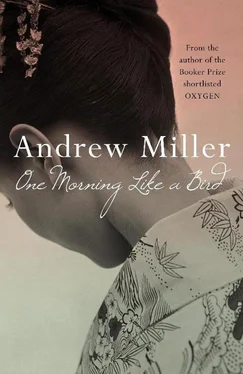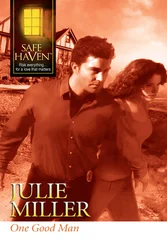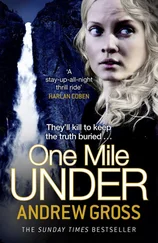Another hundred steps and the house appears, low and weathered under a heavy roof of blue tiles. Grandfather’s housekeeper, Sonoko, is outside, leaning over a starching board she has propped against one of the verandah corner posts. Hearing Yuji, she straightens and wipes her brow with the back of her hand, like a countrywoman looking up from harvesting. She’s forty, forty-five. Dark-skinned, a few freckles across her cheeks, broad hips swelling the lines of her kimono. Pretty in a rustic, old-world way, and with some unusual quality of stillness, of inner poise, that makes Yuji think how pleasant it would be to lie with his head on her lap and sleep for an hour, as he assumes — as everyone assumes — Grandfather sometimes does.
‘He’s in the model room,’ she says.
He thanks her, though he would have looked nowhere else on a winter’s day at such an hour, just as, arriving on a summer’s morning, he would look first in the vegetable garden, or in autumn, in the shade of the trellis outside the kitchen where the pickling barrels are kept.
He pulls off his boots, crosses the eight-mat room, and announces himself at the doors to the twelve-mat, the model room. After a few moments he receives an invitation to enter.
‘I need your young eyes,’ says Grandfather, who is kneeling at the far end of the room, his head almost touching the mat as he peers under the shin-high table that carries the model. ‘There’s a boat down here somewhere. I must have caught it on my sleeve.’
Yuji kneels beside him. After half a minute he finds the boat in the shadow of a table leg. He lifts it, carefully, as though lifting a little singing insect, a kusa-hibari , perhaps, and places it in the palm of Grandfather’s hand.
‘I need stronger lights in here,’ says Grandfather. ‘Or,’ tapping an arm of his glasses, ‘a stronger pair of these.’
The boat, he explains, is a sweet-seller’s boat, the kind that used to be common enough on summer evenings in the old days, advertising its presence with the beating of a drum and carrying such delights as ‘moss in a stream’ and ‘the beautiful Bay of Tango’. He smiles to himself, smiles at his modern, half-Westernised grandson (a creature he should, perhaps, disapprove of, but never has, treating him always with a shrewd generosity of judgement which the boy’s father — the professor, the travelled man! — seems incapable of), then he takes a pair of bamboo tweezers and sets the boat down on the Sumida, that length of curving blue satin he cut from one of his wife’s obi the year she died, the year the model began.
‘So,’ he says, brushing a hand over the stubble on his skull, ‘I told you I had some interesting new pieces. Think you can find them?’
Pausing now and then to crouch and look more keenly, Yuji, in a sideways shuffle, slowly moves the length of the room where, on a table that leaves only the narrowest of corridors, the Low City, from Tsukiji to Umaya Bridge, has been rebuilt out of paper and pins, out of memory and street maps and stories. Hundreds of cardboard roofs, bicycles made from fuse wire, trees whose foliage is skeins of coloured wool. The sides of trams are cut from tins of soya oil. Utility wires are black thread from Sonoko’s sewing box. Those dogs coupling outside the fish market are chewed paper and Chinese ink, their tails a pair of bristles from a writing brush. The Low City, as it might have appeared the last day of August 1923. Still hours to go before anyone will notice a light bulb start to swing or see ripples in the surface of his tea.
‘These are new, I think,’ says Yuji, pointing to two geisha, tall as thimbles outside a tea house in the Yanagibashi district.
‘Shall we see where they’re going?’ asks Grandfather. He holds back the sleeve of his kimono and lifts off the roof of the tea house. Below — and Yuji half expects to see their faces turned up in horror — the tea-house guests are gathered in matted, discreetly screened rooms, while maids and brightly painted geisha dance attendance. Some twelve or fifteen of Grandfather’s buildings have been treated this way, including, below its roof garden, the top floor of the old Mitsukoshi, where Mother was shopping with Mrs Hatanaka when the first shocks hit the city, and where, escaping over the glass of the shattered display cases, she cut her feet so badly.
At midday, Sonoko calls them to eat. They sit around the table-stove. An iron pot is simmering on a stone tile. Sonoko, her hand wrapped in a piece of scorched linen, takes off the lid. Steam pours out, a scent of braised onions, the earthy scent of turnips and something else, something ripe and sweet and bloody.
‘Mountain whale?’ asks Yuji, using Grandfather’s name for the wild boar.
‘I thought we would have something special today,’ says Grandfather, ‘as your visits are rather infrequent.’
‘I apologise,’ says Yuji, ‘I would come more . .’
‘Have I,’ says Grandfather, ‘told you how, one winter, when I was out at Shizuoka, we hunted the young boars?’
‘Hunting . .’ says Yuji, who has heard the story many times. ‘At Shizuoka?’
‘All they could find to eat at such a season was yam. They dug them up, ate them until they were stuffed. As soon as we had shot one, we opened its belly, hauled out the guts. Ready-made yam sausages! Cooked them over the embers of a fire. Ate them with the snow falling on our shoulders . . Ah, a feast like that and you’re ready for the Mongol hordes!’
Yuji waits to see if he will start to sing. He often, under the press of such nostalgia, lets his voice roll from a growl into the wavering line of some old song, but today the stew is too tempting. They grin at each other, three at three, take up their chopsticks, lean towards the pot.
As they eat, Yuji tries to imagine what will happen when the model is finished — what will happen to the model and what will happen to Grandfather. The moment cannot be far away now, no more than another winter, two at most. Will he build an extension onto the house, turn the twelve mats into twenty, let the model grow north to Asakusa? Or will the end of the table be the end of his labours, his memorial to the last of Edo, to the spirit of his eldest grandson, to a thousand streets shaken to firewood then burnt to red ashes?
He has never said what he intends, only that the last piece will be a rickshaw and its runner hurrying past the Bank of Japan. And though he likes to announce this with a solemn, emphatic nod, Sonoko, in her gentle voice, teases him — ‘You were still pulling rickshaws in ’23? Was it your hobby, perhaps?’ — knowing perfectly well that in ’23 Grandfather was a valued customer at the bank, a rickshaw passenger, perhaps, but not for twenty years the man sweating between the poles. The teasing doesn’t offend. Grandfather knows she understands, and Yuji too. The model is a kind of poem, and in a poem time can be folded many different ways.
When they have eaten, when the lid is back on the pot, the pickle dish is empty and the rice tub returned to its winter wrap of plaited straw, Grandfather excuses himself, and with a quick wave, retreats to the back of the house for his afternoon nap.
Yuji goes with Sonoko onto the verandah. He puts on his boots. A breeze is ringing the little iron bell that hangs from the eaves (and how cold the sound is, like the tinkling of ice). When he is ready, and his coat is buttoned, she hands him a sheet of writing paper wrapped round a pair of ten-yen banknotes.
‘Grandfather understands your difficulty,’ she says, ‘but hopes you will learn soon what needs to be done.’ She bows to him. He pushes the money into his coat pocket and sets off down the path, his boots crunching over a lattice of winter shadows.
Читать дальше












